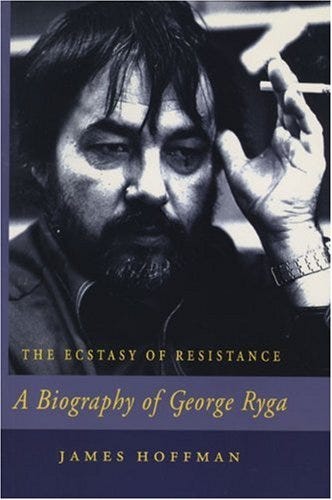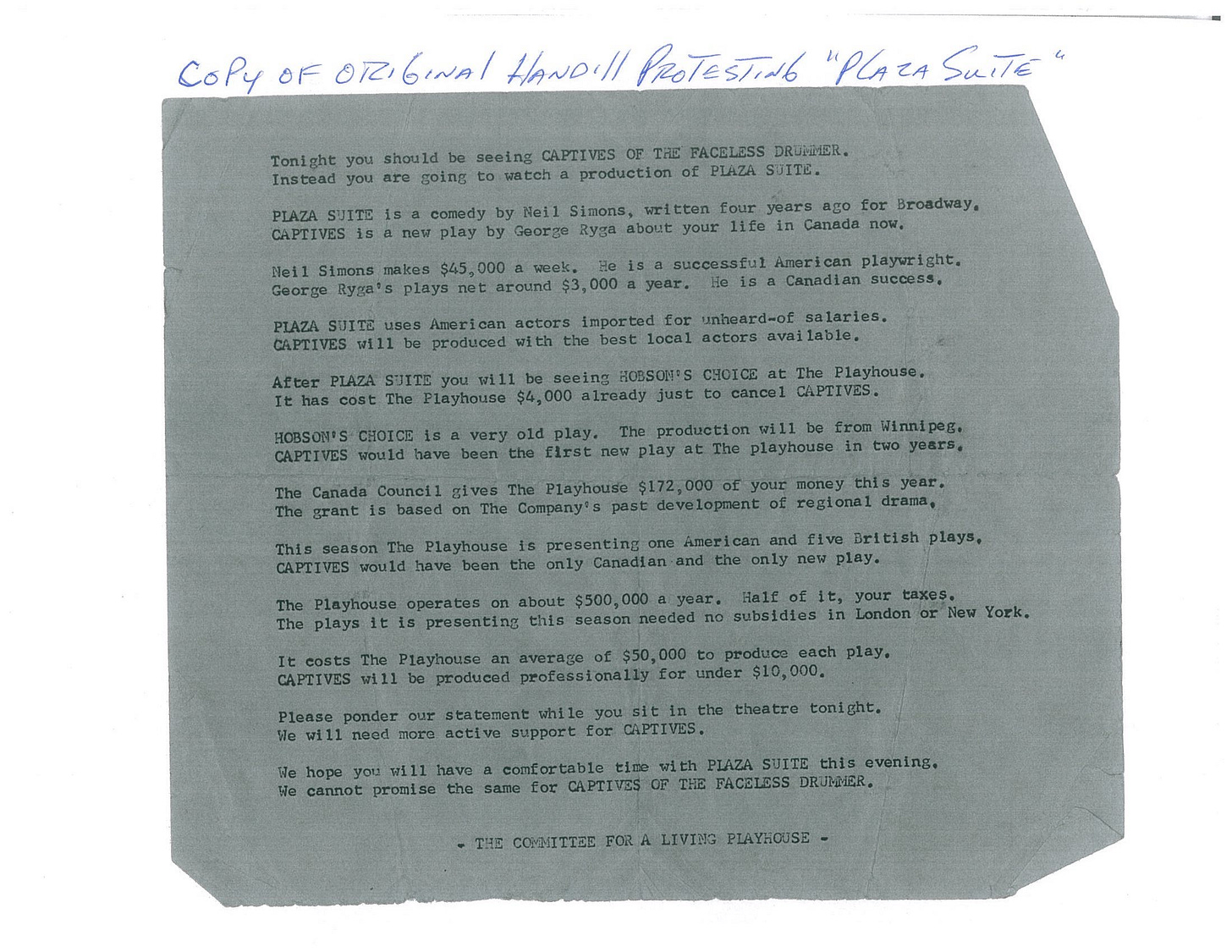Writing a Play With George Ryga, Fridging Maria Hill & Why I'm Substacking
Remembering the celebrated playwright's most controversial play on what would have been his 91st birthday... The pointless death of a Marvel MVP... And why I've launched on Substack...
Hi. Thanks for making time for whatever this turns out to be...
A heads-up that if you’re looking for my thoughts on orcas, sharks, octopuses, ocean-life, ocean death and all the animals and issues I cover for Skaana (the podcast that has been running my life since 2017) I’d love it if you’d subscribe to the Substack newsletter I started here for Skaana a few years ago (originally as an e-blast). Even better… please subscribe to the podcast on iTunes and Spotify so we can get back to the top of the charts.
Writing a Play With George Ryga
George Ryga, one of Canada’s most important writers, was born July 27, 1932. He died November 18, 1987. We wrote a play together in 2002.
Yes, the math on that looks… strange.
No, Ouija boards and seances were not involved, though I did spend a fair bit of time at his former home in Summerland, B.C. (when it was The George Ryga Centre) to get a sense of his spirit.
When CBC TV was setting out to celebrate their 50th anniversary they reached out to about a half dozen famous Canadian writers. And me. I’m not being modest. The other writers were people like Paul Quarrington. CBC was looking to celebrate their anniversary by producing their first live TV drama in decades and offered several writers a commission to develop our own pitches.
If you’ve heard of George Ryga - and in 2023 that’s a big if, even if you’re into Canadian theatre - you likely know he’s the guy who wrote The Ecstasy of Rita Joe. This was long considered Canada’s most important and/or best play. Both those titles may be debatable. The impact that play had on key players in Canada’s federal government… not so debatable.
You likely don’t know that before Rita Joe, Ryga wrote the most successful and celebrated live drama ever to air on CBC - Indian - which made so many waves that the script was published in Maclean’s Magazine.
The reason you don’t know this (and/or don’t even know Ryga’s name) isn’t just because Canadian schools don’t teach enough Can Lit and Ryga wrote before the arrival of the internet, it’s that in 1971 he wrote a play for The Vancouver Playhouse called Captives of the Faceless Drummer that was censored, then slandered, which led to a campaign to pretty much savage his reputation as a writer. And forgetting the existence and impact of his other works like Indian made it easy for numerous people to attempt to claim shocking amounts of credit for the creation and/or success of Rita Joe and to dismiss the success of that play as a lightning strike.
Anyway… the chance to pitch a dream project to CBC came not long after Sept. 11. 2001. I believed that after the infamous attack in New York, civil liberties were likely to vanish pretty much everywhere and Canada was going to see the same sort of censorship that took place during the War Measures Act - the original Trudeau’s response to the FLQ Crisis - which was the spark behind Captives. And I thought… writing about Ryga’s 1971 play about that controversy would give me the chance to address what the world was going through 30 years later.
I’m mildly obsessed by the theatre and radio career of Orson Welles…. yeah, I heard he also made some movies… but not as exciting to me as his adventures as a stage director and radio wizard. There have been multiple movies and plays written about his infamous staging of Clifford Odets’ drama Waiting for Lefty. As far as I knew, none of them cleared a single scene of Waiting for Lefty. So the audience for the plays and movie about the play know that something was censored, but really never get to see what the fuss was about.
If I was going to write about Captives of the Faceless Drummer I was only going to do it if I could use full scenes from Captives of the Faceless Drummer.
Fortunately, my agent, Donna Wong-Juliani was friends with pretty much everyone connected with Ryga and married to frequent Ryga collaborator (and my mentor) John Juliani.
I signed a contract with the Ryga estate giving me permission to use scenes from Captives - with John signing off on my work and anything I did with the Captives script as a proxy for Ryga and his estate. And I was determined to make it clear that the material I was using from Captives was written by Ryga and that his estate was compensated for it. So the official credit (after some wrangling with the CBC and the Writers Guild of Canada) was “Written by Mark Leiren-Young and George Ryga.” And when I received a cheque from CBC, I shared a percentage of it with his Estate.
Both Ryga’s friends and his agent made me promise that I would retain the stage rights for the project because - and several people said this, but most used more colourful language: “This will never air. The CBC will screw George.”
I was commissioned to go to script, but the plan to produce a live TV drama as part of the anniversary celebrations was kiboshed. My script didn’t make it to air, but no one else’s did either - so I started shopping the play…
My play, Captives: The Ecstasy of George Ryga, has had several public staged readings - and the response has always been great - but it has not been produced… yet…
So, if you’re interested in a world premiere… you know where to find me.
Meanwhile, if you’d like to read a scene or two, please let me know and I may share some of it here. For now… a piece from the vaults…
This was read onstage by an actor the night Captives was supposed to debut at the Vancouver Playhouse. Heck yeah this is a scene is in my play…
Comic Talk
Was Maria Hill Fridged in Secret Invasion?
So I teach a Writing course at the University of Victoria where I look at writing and various other subjects and concepts through the lens of the Marvel Universe and another where I look at writing (and more) through the lens of the DC Universe. I’ll share more about these classes and how they happened some other time but, for now, I thought I’d just set up that I’m gonna occasionally nerd out about the MCU and the DCU here…
Secret Invasion Vs. Maria Hill
Here’s how impressed I am with Secret Invasion… The finale came out yesterday and… I’m sure I’ll watch it eventually… But Good Omens 2 debuts tomorrow and the brilliant new Trek is a cross-over with Lower Decks and… part of my indifference comes from the utterly pointless death of long-time SHIELD agent, Maria Hill.
Hill is played by Cobie Smulders and she has been an MCU fixture since 2012.
She’s integral enough to the MCU that she’s the guide for the Avengers exhibitions that tour North America. I went once in Vegas. Once in Burnaby… Despite the total lack of Spidey, they are Marvel Nerdvana.
I’ve seen Hill’s death - where she’s shot by a Skrull disguised as Nick Fury (the cornerstone of the MCU played by Samuel L. Jackson) - called out as an example of fridging. If you don’t know the term, I’ve included a great brief definition and history below.
Thing is… fridging is about doing something horrible to a female character to further the arc of the male hero. Usually this means the super dude gets a scene along the lines of… “I will avenge you…” or “it’s all my fault…” and includes some grieving, gnashing of teeth, a killing spree and/or the type of emotional response that goes on an actor’s reel at award’s season. Basically, the death, torture and/or maiming of a female character is intended to create motivation or meaning for the male lead.
But Maria Hill’s death… I’m not sure it qualifies as fridging because it served no purpose beyond a few seconds of shock value.
Fury is over the loss of his right-hand woman almost immediately. He spends far more time and emotion on… almost every other character and plot-point in the series, including the death of his Skrull buddy (who was much more a bit player in the MCU than Hill).
Not only doesn’t Fury grieve Hill, but there isn’t a proper beat for any audience member who cared about her to do much beyond wonder if Marvel really just went there...
And as a plot point… Nick Fury killing anyone in the scene where Maria Hill dies… Heck, Fury being at the site of the carnage… would accomplish exactly the same thing…And it’d make soooooo much more sense for the scheme to set up Fury as baddie to have him appear to kill a politician - or a host of civilians - than a SHIELD agent. And even if you buy that killing Hill has any specific value to setting up Fury as a globally-wanted baddie (a plot point handled so much better by Mysterio that maybe he should be leading the Skrulls) the storyline is set up and almost immediately forgotten.
The death of Maria Hill felt less like it was about giving Fury and/or Jackson something to react/act to and more like Cobie Smulders asked for a raise and she was taken out like one of the interchangeable officers or lawyers on Law and Order…
My suspicion is the sit-com length of the last few episodes of the series is because there are a lot of scenes that never made it to air. So I wouldn’t be surprised if somewhere in a cut-scene Maria Hill’s death means… something to someone.
If you haven’t heard of “fridging” here’s a great definition by Alyssa Bradley writing on a site for the University of Missouri - Kansas City’s Women’s Centre: “Women in Refrigerators” or “fridging women” is a term coined by Gail Simone, which is used to refer to the disempowerment or maiming of female characters. The origin of the term came from the 1994 comic The Green Lantern #54. The hero, Kyle Rayner, returns home to find his girlfriend, Alexandra DeWitt, killed and stuffed in a refrigerator. This trope became recognizable as a way for authors to use female characters as devices to project their male characters forward in their story.
So here’s why I’m Substacking…
Once upon a time I made a decent part of my living writing columns and commentaries for (mostly Canadian) newspapers and magazines. I even won some awards for writing these columns…
Then I started writing books and movies and the people who used to pay me for columns and commentaries declared that this same writing they used to pay me for now qualified as “promotion for my books.” Because, as all writers know, nothing buys you that dream car (or lunch at Tim Horton’s) faster than the royalties on a Canadian bestseller….
Not only was I suddenly expected to write for free, but as publications started running on tighter budgets I found that the editing was becoming… let’s go with sloppier. It wasn’t non-existent. I would have been just fine with non-existent.
And I thought… I’m writing for free… and cringing at some error added by an intern using “spell check.”
Like when an editor at one of Canada’s finest publications (not being sarcastic about that) didn’t recognize a quote from Alice in Wonderland and “fixed” a famous line of Lewis Carroll’s so it read: “curious and more curious…”
Or when I spent weeks crafting an article that was probably the best piece of prose I’d written in a year or two and the editor of one of Canada’s best publications slapped a headline on it that was such inflammatory clickbait designed to spark social media hate that I shared it with no one and am not linking to it here.
So… I started sharing the occasional story on my blog (which required too much effort to promote) and Medium (which was SO easy to use). And then Medium started pay-walling…
And then I started reading the work from so many great writers here…
And I wanted to subscribe to some of the great writers here.
I have activated the paid subscription option to see what happens but, for now, I just wanted to join the conversation here and share some stories where any errors or terrible headlines are my fault. And where they are easy to correct or improve on. So, if you spot any, please let me know.
And if there are any stories you’d like me to share, just ask.
Thank you for your time.
Mark









So you joined Substack for the same reasons I did. I look forward to see how both of our writing evolves here.